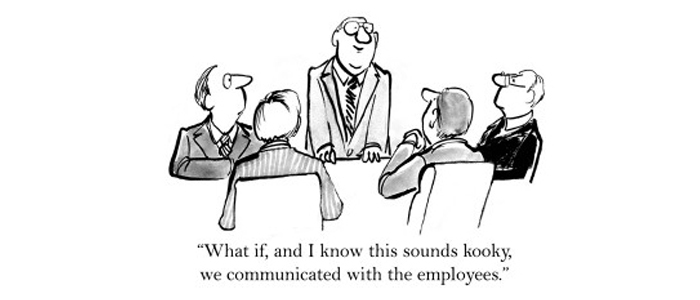Evidence supporting the economic benefits for organisations with happy employees is overwhelming. So how to do you start to create a happy, healthy working culture? Here are some handy pointers.
Many people we meet work in not-very-happy organisations whose leaders are invariably not described as ‘happy’! Many leaders describe themselves as “OK” or “fine”, their criteria being the number and importance of the issues or problems they’re currently trying to sort out. But happy? Rarely.
But if you have a choice of being happy and working in a happy environment, why shouldn’t you choose to do so rather than a stressful, bullying, snappy work environment?
Where do you start?
Creating happiness and wellbeing in an organisation is one of your responsibilities as a leader. But do you really understand how paralysing it can be for those around you to work with executives who are themselves unhappy?
It is hard to make others happy if you are not happy yourself. This is why authenticity is so important to truly compelling and engaging leadership. And no, your annual conference and work socialisers do not do the job. No amount of prize-giving, food and alcohol hides the underlying culture of a company. One person we met recently commented, “I see our yearly conference as a very expensive way our [leaders] say sorry for being so consistently incompetent at creating a great work environment.”
Are you doing enough to make those around you happy?
A starting point is to find out how healthy your organisation is. A key part of our Organisation Health Check is to feed back to leaders the impact they have on people in their organisation every day, both positive and negative. This is a great starting point as it clarifies what actions you can take immediately to create a strong positive culture. It comes as a relief to many that there is a lot they can do rather than just put up with being unhappy at work.
So what can you do straight away?
In understanding what creates happiness, research published in the Harvard Business Review referred to the work of psychologist Ed Diener, who essentially shows that the frequency of your positive experiences is a much better predictor of your happiness than is the intensity of your positive experiences. In other words, when it comes to happiness we appreciate more frequent moments of joy, even if they are less significant than incredible single events.
If you agree that this holds true in your professional life as much as in your personal life then this is great news. It is the small things that matter and will have a more lasting impact than the one bigger thing that you think you are waiting for. If you are not seizing seemingly minor, everyday moments to create happiness for yourself and others then you and your organisation are missing out.
The opportunity in all of this seems to be to pause and ask yourself, “Have I done enough today to make others happier in some small way?” If you are not satisfied with your own answer, chances are that others are following your lead.
The link between happy employees, a healthy, constructive organisation culture and economic success is deservedly getting more and more focus. The message is slowly becoming clearer – that, as a leader, you can make a real difference to the quality of your work life, to the happiness and wellbeing of the people you work with and to yourself.
Want to read more of the same? Then click on the graphic below to receive a monthly digest direct to your inbox.

